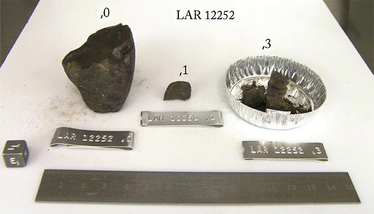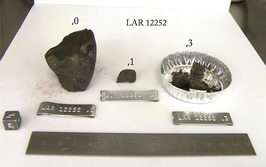New Findings Challenge Long-Held Theories of Water’s Origin on Earth
Water on Earth is native, according to spectroscopic meteorite analysis
| 3 min read | News

Lab photo of sample LAR 12252.
Credit: NASA.
Scientists have found evidence that Earth’s building blocks were far richer in hydrogen than previously thought – challenging the dominant theory that Earth's water was delivered later by asteroids. The findings suggest that the formation of habitable conditions on Earth may have been a natural outcome of the planet’s original makeup.
Researchers from the University of Oxford analyzed a meteorite known as LAR 12252, a type of enstatite chondrite thought to closely resemble the material from which Earth formed 4.55 billion years ago. Using sulfur X-ray Absorption Near Edge Structure (S-XANES) spectroscopy at the Diamond Light Source synchrotron, they detected significant quantities of hydrogen intrinsically bonded within the meteorite’s structure.
“We were incredibly excited when the analysis told us the sample contained hydrogen sulphide – just not where we expected,” said lead author Tom Barrett, a DPhil student at Oxford’s Department of Earth Sciences, in a press release. “Because the likelihood of this hydrogen sulphide originating from terrestrial contamination is very low, this research provides vital evidence to support the theory that water on Earth is native – that it is a natural outcome of what our planet is made of.”
The team focused their investigation on the meteorite’s fine matrix material, analyzing more than 9,000 micrometre-scale spectra. They found that hydrogen, in the form of hydrogen sulphide (H₂S), was concentrated in the fine-grained material surrounding larger mineral fragments – particularly in association with pyrrhotite, a form of iron sulfide. The amount of hydrogen bonded to sulfur was found to be up to ten times greater in the fine matrix than in other regions such as chondrule mesostasis.
Until now, the dominant model proposed that Earth’s early materials were “dry” and that water arrived via a later bombardment of water-rich asteroids or comets. However, the new study suggests that Earth may have accreted sufficient hydrogen – and by extension, the potential for water – directly from its original building blocks.
Co-author Associate Professor James Bryson noted, “We now think that the material that built our planet – which we can study using these rare meteorites – was far richer in hydrogen than we thought previously. This finding supports the idea that the formation of water on Earth was a natural process, rather than a fluke of hydrated asteroids bombarding our planet.”
The findings also have broader implications. If Earth's water was inherited from its primordial materials, other terrestrial planets formed from similar materials – such as Mars and Mercury – could have also started with significant volatile inventories.
By identifying hydrogen locked within pyrrhotite and surrounding silicate-rich glass in the meteorite, the researchers propose that hydrogen incorporation was a product of chemical reactions in the early solar system’s disk, rather than later cosmic accidents. The presence of hydrogen sulphide trapped during rapid cooling processes supports this view.

















